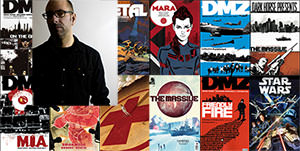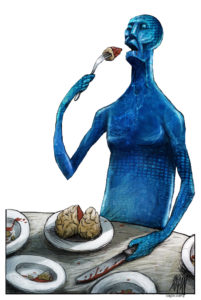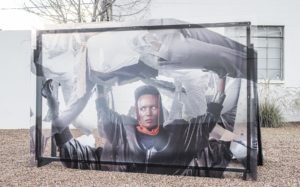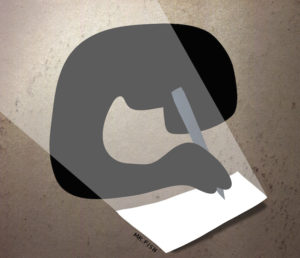Ripped From Tomorrow’s Headlines: Brian Wood, Comic Book Futurist
Brian Wood is a best-selling comic book writer whose body of work expresses a political and social awareness that ranks with the best in speculative fiction.
“DMZ.” Collapsing from the combined weight of prolonged foreign conflicts and internal ideological differences, the United States descends into a bloody civil war that turns New York City into a violent, gang-run ghost of its former self.
“The Massive.” An unexplained series of hurricanes, earthquakes and floods shatter the globe, and now a ship full of of radical environmentalists faces a new challenge: They’ve failed to save the world, so what next?
“Mara.” In a shiny, antiseptic future run by powerful corporations, athletes are treated like superheroes. But when one of the nation’s top athletes develops actual superpowers, she becomes public enemy No. 1.
These worlds — terrifying, plausible and in some cases even already coming into being — spring from the mind of Brian Wood, a best-selling comic book writer whose body of work expresses a political and social awareness that ranks with the best in speculative fiction. Even when writing established characters and series rather than on his own personal fictions, Wood has consistently demonstrated a modern and politically progressive sensibility. His contribution to the new “Star Wars” reimagines Princess Leia as a fighter pilot; his Conan the Barbarian is a sensitive, thoughtful hero whose actions bely his nickname; and he recently penned an “X-Men” reboot at Marvel Comics that launches next month with an all-female cast and a team of the industry’s top artists.
We met with Wood in a Brooklyn coffee shop to talk about the stories he’s most proud of, the first paperback collection of his new series, “The Massive,” the industry pressure to focus on male protagonists, and the uncanny prescience of his 21st century civil war epic, “DMZ.”
Sheerly Avni: You have a reputation in the comic book world as being extremely liberal. Where did that come from?
Brian Wood: Well the first book I ever did, “Channel Zero,” is from when I was studying at Parsons in New York. It was very political, in that Angry Art Student kind of way. There was zero subtlety to it — you know, I was 25 and I hated [former New York Mayor Rudy] Giuliani. But it sort of got my name out there, and there are still readers that see me as super liberal, and no matter what I do, they say “there he goes again.”
When I started on “DMZ,” the book I’m probably best known for now, I tried to write in a way that there was a little bit of good [and] a little bit of bad in everyone. And Matty, the journalist who is my main protagonist, makes a lot of mistakes, because he starts out not really understanding what he’s reporting on.
SA: A lot like that first wave of embedded journalists in Iraq. Did you read a lot of first-person reporting?
BW: So there’s a lot of information to be found there, but there was one book in particular: “The Hidden War,” by a Soviet novelist in Afghanistan. If there was any one thing I was most inspired by, it was that. He wasn’t officially embedded. … It felt very natural, it felt very honest. He wasn’t afraid to criticize anything.
SA: That didn’t happen much in the beginning of the war. It was a very jingoistic period.
BW: Yeah. I also watched all the films at the time, like “Black Hawk Down,” which I found hard to sit through. … There were a lot of emotions running high back then, and I saw it in a theater and there were people in the audience screaming “terrorist!” at every black person on screen. … When I think back on that, I can barely believe it.
When I launched the series, I knew I’d be accused of preaching or putting my personal beliefs into it, so I really would rebel every chance I could get against that idea, to keep readers guessing. When the tea party happened, I’d get email from fans, comparing the tea party to both sides in the book, and then the same thing happened when Occupy started up. I tried hard not to be too preachy, and just let the story speak for itself.
SA: Still, what’s amazing is that you started writing “DMZ” almost 10 years ago, and a lot of what you wrote about started to come true, albeit in a much milder form. Did you know when you first conceived the project just how timely a story about a deeply divided, war-depleted America would become?
BW: I always tell this rather dark story about when I first pitched it in 2003. It took a while to move. I remember talking to my editor when we were trying to get it going and the wheels were moving really slow, and I made this joke — which is a horrible, flip joke: “You have to hurry up because the Iraq War is going to end before our book comes out!” It’s crazy that we really did think the war would end so soon.
SA: It lasted even longer than the series. And then you immediately followed up with “The Massive,” another politically charged epic, this time about a global crash that follows a series of environmental disasters. What was the inspiration there?
BW: So much of what I do is very practical and very commercial. I’m very aware of the marketplace, and of earning a living. So when “DMZ” was starting to wrap up, I realized I needed to do something of equal stature to satisfy my readership. I’m not like a super environmentalist; I had been becoming more and more aware of it since I had kids. My big worry, rational or not, is this idea of clean water. I can take a 20-minute shower and not even think about it but when my kids are 40, I’m pretty sure they’re not going to be able to enjoy that reality.
And again, I wanted to avoid the whole global warming debate, so I set in a world when that debate is moot. You can’t ask whether disastrous climate change is about to happen, because right from the beginning of “The Massive,” it’s already happened.SA: Do you see this as a potential universe that your kids might have to navigate?
BW: I don’t think it’s possible. Like what’s happened in the book is that every warning and every best guess about what will happen if we’re not careful, all comes down at once, for reasons that are not immediately apparent. I forgot to say, a lot of the inspiration for this was around the economic 2008 crash. Like a lot of my friends were really freaked out: We’ll all gonna be eating cat food in a month. There were a lot of worst-case scenarios. I called it The Crash in the book, because even though it’s environmental at the start it caused a domino effect. The global economy has crashed and the governments are ineffective and borders cease to have a meaning.
SA: And its main characters are from all over the world — Sri Lanka, Chechnya, Australia …
BW: That was very much a reaction to “DMZ,” which was so American and so local. I created a world in “DMZ,” but I defined it so I could only show New York. It meant a lot to me to be able to have a global cast. And the other thing that I’m finding myself more and more drawn to — and you’ll see it as the story progresses — is the histories of the characters and the way that they all come from violent backgrounds. They’re all a little bit older, and there’s an idea that you can change your life and do good, but you’re going to be constantly haunted by the sins of your past, and the demons are going to keep finding you.
SA: What were some of your inspirations from literature, television, etcetera?
BW: Definitely the maritime research that I’d done for another series I wrote called “Northlanders,” which was about Vikings and is one of the things I’ve done that is nearest and dearest to my heart. Also, and it’s very obvious in the first couple of issues, there was that “Whale Wars” TV show. The early seasons of that show blew my mind, because I couldn’t believe these weird college kids from Australia were just throwing bottles of acid at giant whaling ships! I was really impressed with that; they were walking the walk.
Eventually the show changed or was edited in a different way, where it got really annoying, and very much “look at these dumb kids; they don’t know what they’re doing.”
SA: And speaking of dumb kids, let’s talk about this upcoming all-female “X-Men.” Were you an “X-Men” fan growing up?
BW: This is where I’m kind of different from all my peers. I didn’t read comics at all until I was in college. I grew up in Vermont, and I was outdoorsy, so it was a lot of Jack London, man vs. the elements type stuff. Thank God for my mom, I think I also read every classic young adult book, including all the the girl ones, like those Judy Blume books about getting your period and everything. I read “Harriet the Spy.” I had an older sister, so all the books were all there.
SA: And consequently you ended up being well known for writing strong, complex female characters. And now, for this X-Men reboot, all the characters are going to be female, even Wolverine!
BW: There is such an abundance of great women characters in the “X-Men.” If it’s natural for this to happen in any book, it’s the “X-Men.” The problem is that a lot of times this is attempted and it’s really hard to make a book like this stick. Usually they sort of test the waters with a lesser known character, and then of course it fails and then it’s back to the old argument: “Women characters don’t sell.”
SA: It becomes a self-fulfilling prophecy.
BW: To their credit, Marvel tries over and over and over again. This is a big deal because it’s the first time they’re going to try to do a top book, from issue one, of a big franchise, with all the A-lister characters. A lot of what we — meaning me and my editors — are trying to do is just reverse the flow. There’s this common perception: Women characters suck, women don’t read comic books, etc. If we can do something big — this is as big as we can do — just to shift that, because we need to be interventionist.
SA: There’s been a lot of vitriol on the chat sites, in the vein of “What are they gonna fight with, tampons?”
BW: Yes, there is this aspect of fandom that is just chauvinist males. And there’s always that guy saying that pretty soon I’ll have to put men in there to boost sales. And I take that as the challenge, like, “I’m going to prove that guy wrong.”
[laughs]
I guess you could say there’s a little pressure on me.
Your support matters…Independent journalism is under threat and overshadowed by heavily funded mainstream media.
You can help level the playing field. Become a member.
Your tax-deductible contribution keeps us digging beneath the headlines to give you thought-provoking, investigative reporting and analysis that unearths what's really happening- without compromise.
Give today to support our courageous, independent journalists.









You need to be a supporter to comment.
There are currently no responses to this article.
Be the first to respond.